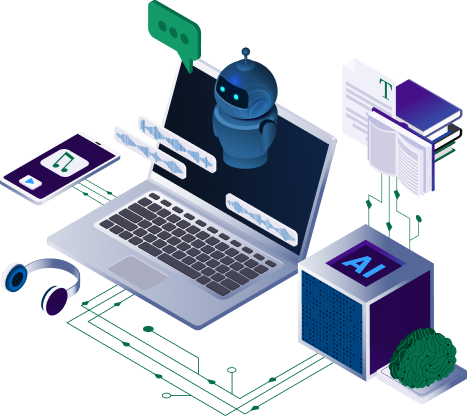
About the Client
Our client is a successful software company that specializes in providing software solutions, at the same time utilizing various technologies. The company creates high-quality programs, provides universal solutions for development, and guarantees a complete product.
Business Context
Our specialists have joined the internal department of the company to help the specialists realize the RnD ideas.
The work in the department related to LLM systems, namely the navigation site and the AI assistant, in terms of a chatbot. According to the requirements of our client, the model had to work in two cases:
- As an assistant, that would help the end user navigate all categories or sites in a specific domain
- As an AI assistant with a generative function.
Amazinum Data Scientists in Action
Amazinum specialists have created a system that processes the request, saves it in the knowledge base, and returns to the user with ready-made information on the direction of receiving information – the site URL that the user needs.
The Amazinum Data Scientists team considered two modules that help work with LLM systems – LangChain and Haystack.
- LangChain – is a framework that makes it easier to create applications that use large language models. LangChain is a language model integration framework, and its use cases—which include chatbots, code analysis, and document analysis and summarization—largely mirror those of language models in general. This framework is quite common among specialists working with LLMs.
- Haystack – which is set to build production-ready applications with the open-source LLM framework. At the same time, the Haystack module is more tuned to specific settings and is more convenient for using QA tasks.
Amazinum data scientists used the Huggingface- google/flan-t5-large model, training it through the Haystack intermediate link. The Haystack environment is configured using Zero-shot Learning technology. After that, the modified model is adapted to specific requirements and specifications.
For the model, prompts (requests) were created according to certain requirements of the topic. After that, the model with ready-made answers was wrapped through the REST API – Fast API services, and then in Docker. In this way, a container was created that could be hosted on any service.
Among the additional functions that the client needed was an AI assistant that had to meet certain requirements. Among the requirements were clear, concise, or friendly answers, justifying the request in less than 3-4 seconds, and others.
Outcome
In this way, the development of a domain chatbot significantly improves the work of the business, making it more convenient for the client and more optimized for the owner. Here are some benefits that the business owner and end user will receive.
Enhanced Interaction with Customers:
A domain chatbot increases engagement by responding to consumer inquiries immediately and individually. Customers have a positive experience interacting with the brand because they can easily obtain information, assistance, or complete transactions.
Constantly Available:
Chatbots are always available to customers, offering constant assistance irrespective of time zones or business hours. This makes sure that companies can always meet the needs of their customers, which increases accessibility and satisfaction.
Cost Reductions:
By automating tedious and repetitive tasks, the use of a chatbot can reduce costs. Long-term operational costs decrease as a result of human resources being able to concentrate on more intricate and valuable tasks.
Effective Automation of Tasks:
Chatbots are particularly good at automating certain tasks within a given domain. This entails responding to routine client inquiries, completing transactions, dispensing information, optimizing workflow, and cutting down on manual labor.
Enhanced Customer Assistance:
Instant answers and reliable service are two ways that companies can improve their customer support. Chatbots can handle a lot of inquiries at once, speeding up response times and guaranteeing that clients get help when they need it.
Gathering and Analyzing Data:
During conversations, chatbots can gather important customer information. Businesses can improve customer experiences and refine their strategies by analyzing this data to gain insights into customer behavior, preferences, and frequently asked questions.
Scalability
Because of their scalability, chatbots can handle increased customer interactions without requiring a corresponding rise in resources. Scalability like this is especially helpful for companies whose clientele is in and out of season.
Customized Experiences for Customers:
Chatbots can tailor interactions according to each customer’s preferences and past experiences through data analysis. This degree of customization improves the general client experience by increasing the relevance and significance of interactions.

